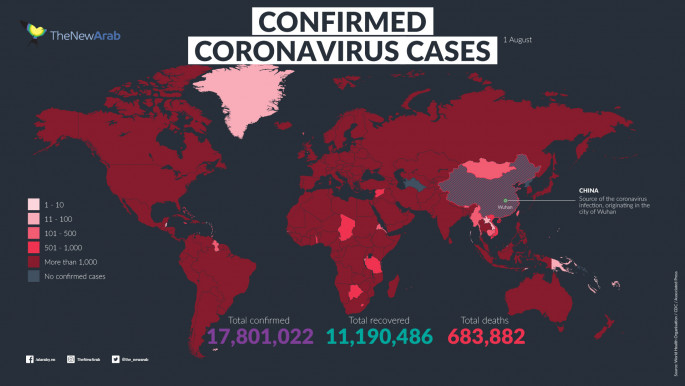Arab states use of artificial intelligence to fight coronavirus raises concerns over mass surveillance
Arab states use of artificial intelligence to fight coronavirus raises concerns over mass surveillance
Arab states have alarmed human rights organisations with the use of artificial intelligence tools to combat coronavirus.
3 min read
[Getty]
Saudi Arabia, Oman and Kuwait are just some of the Gulf countries that are using artificial intelligence to increase their surveillance of citizens amid the coronavirus pandemic, arguing that by doing so they are fighting the outbreak.
However, there are concerns that these measures – enacted by kingdoms, autocratic nations and dictatorships – are impinging on civilians' human rights.
Gulf Cooperation Council members, which include Bahrain, Qatar, Oman, Saudi Arabia, Kuwait and the United Arab Emirates, have imposed the strictest measures in the name of curbing coronavirus, according to John Hopkins University research.
These include grounding flights completely and severe lockdown measures that keeps people firmly in their homes – with thousands being arrested if they flout the rules.
However another layer of mass surveillance has emerged – and it has experts worried.
Speed cameras, robots and drones are being utilised as a form of mass surveillance to ensure that social distancing instructions are being adhered to; systems that allow for contact tracing gives governments the ability to monitor those that have tested positive for coronavirus and trace where they have been and who they have been in contact with.
Similar measures have been used in South Korea, and many experts attribute the country's reduction of cases to them.
In Bahrain, an application called BeWare allows citizens to track how close someone with Covid-19 is, by using location services.
"BeAware registration is mandatory for those in quarantine, while non-quarantined cases may choose to register," Mohammed Ali AlQaed, chief executive of Information & eGovernment Authority in Bahrain told CNBC.
In the UAE, the government is using AI to limit the movement of those living in Dubai. Police are also heavily checking that residents are carrying the compulsory permits needed to leave the house.
The police do this by using a program called Oyoon, which uses cameras in the city to track residents using facial recognition software, voice recognition and licence plate checks.
It then uses a database to cross-reference information about the residents, such as where they work and if they have a valid permit to leave their homes.
Critics of such efforts claim they severely undermine personal privacy.
Meanwhile, a hacking group that supports the Syrian regime is believed to be 'targeting' people with Covid-19 Android Malware.
Researchers at a cybersecurity company called Lookout found spyware that they suspect could be used on Google Android users to spy on them through their phone cameras and microphones, as well as taking personal data from their device.
The Android app is called "Covid19", according to Forbes, and is suspected of being used to target Syrian citizens. The user is asked to download a "digital thermometer" that is actually fake, and when the user holds their finger on the screen, a malware called AndoServer is used to spy on them.
Lookout's Kristin Del Rosso discovered the app. She told Forbes there was a "high probability" that it was created by the Syrian Electronic Army (SEA), a pro-Assad hacking group.
The app contained "traces" of someone called "Allosh", an alias that had been associated with a previous hacking campaign carried out by the SEA.
However, there are concerns that these measures – enacted by kingdoms, autocratic nations and dictatorships – are impinging on civilians' human rights.
Gulf Cooperation Council members, which include Bahrain, Qatar, Oman, Saudi Arabia, Kuwait and the United Arab Emirates, have imposed the strictest measures in the name of curbing coronavirus, according to John Hopkins University research.
These include grounding flights completely and severe lockdown measures that keeps people firmly in their homes – with thousands being arrested if they flout the rules.
However another layer of mass surveillance has emerged – and it has experts worried.
Speed cameras, robots and drones are being utilised as a form of mass surveillance to ensure that social distancing instructions are being adhered to; systems that allow for contact tracing gives governments the ability to monitor those that have tested positive for coronavirus and trace where they have been and who they have been in contact with.
Similar measures have been used in South Korea, and many experts attribute the country's reduction of cases to them.
In Bahrain, an application called BeWare allows citizens to track how close someone with Covid-19 is, by using location services.
 |
"BeAware registration is mandatory for those in quarantine, while non-quarantined cases may choose to register," Mohammed Ali AlQaed, chief executive of Information & eGovernment Authority in Bahrain told CNBC.
In the UAE, the government is using AI to limit the movement of those living in Dubai. Police are also heavily checking that residents are carrying the compulsory permits needed to leave the house.
The police do this by using a program called Oyoon, which uses cameras in the city to track residents using facial recognition software, voice recognition and licence plate checks.
It then uses a database to cross-reference information about the residents, such as where they work and if they have a valid permit to leave their homes.
Critics of such efforts claim they severely undermine personal privacy.
|
Meanwhile, a hacking group that supports the Syrian regime is believed to be 'targeting' people with Covid-19 Android Malware.
Researchers at a cybersecurity company called Lookout found spyware that they suspect could be used on Google Android users to spy on them through their phone cameras and microphones, as well as taking personal data from their device.
The Android app is called "Covid19", according to Forbes, and is suspected of being used to target Syrian citizens. The user is asked to download a "digital thermometer" that is actually fake, and when the user holds their finger on the screen, a malware called AndoServer is used to spy on them.
Lookout's Kristin Del Rosso discovered the app. She told Forbes there was a "high probability" that it was created by the Syrian Electronic Army (SEA), a pro-Assad hacking group.
The app contained "traces" of someone called "Allosh", an alias that had been associated with a previous hacking campaign carried out by the SEA.





 Follow the Middle East's top stories in English at The New Arab on Google News
Follow the Middle East's top stories in English at The New Arab on Google News
![Lebanon central bank [Getty]](/sites/default/files/styles/image_330x185/public/1566027836.jpeg?h=a5f2f23a&itok=XjrkNQAi)

